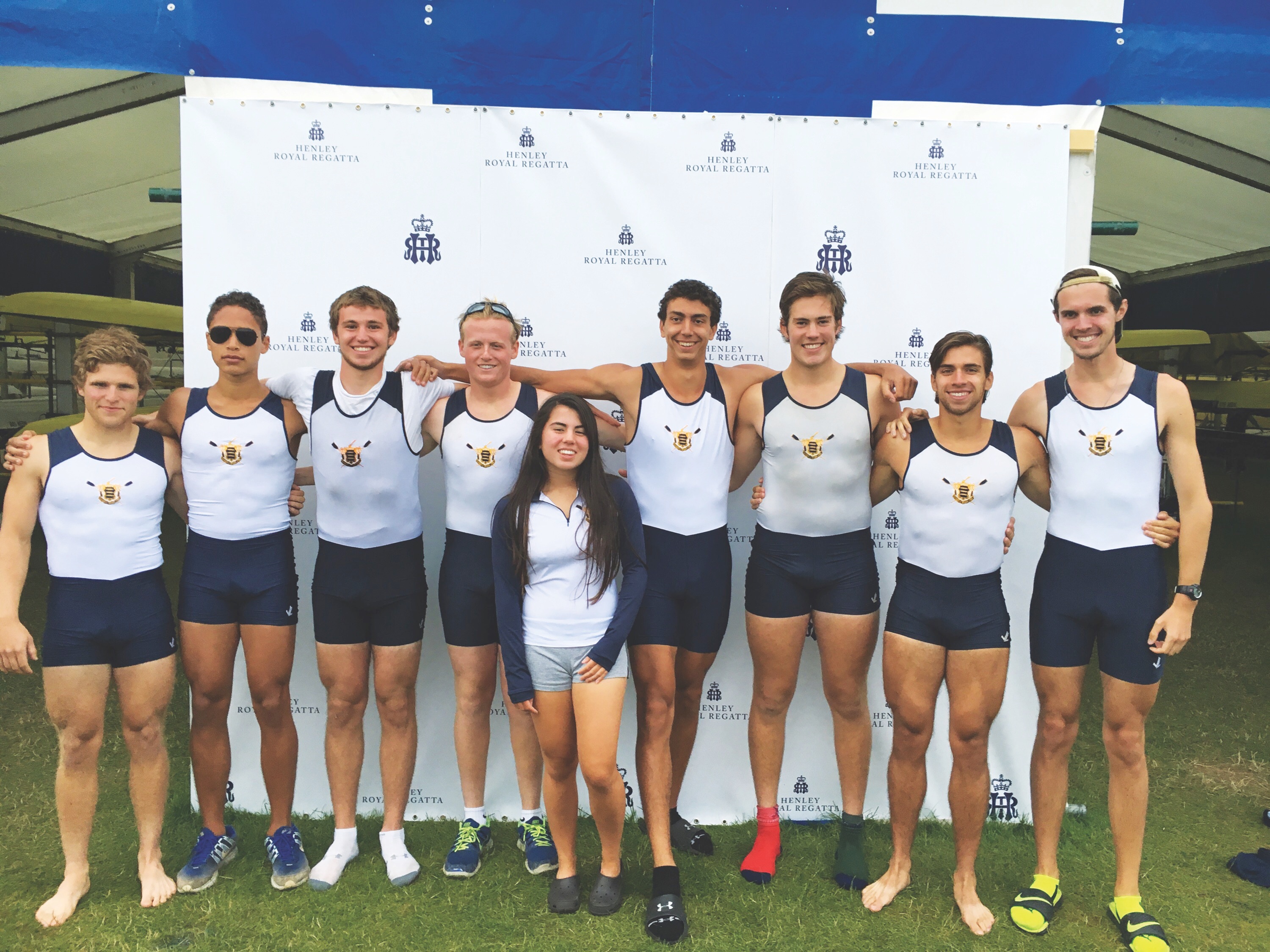Fourteen members of the Choate boys’ rowing team mingled with some of the best crews in the world on June 28 in England at the Henley Royal Regatta, one of the most prestigious rowing events in world. Two Choate boats competed in the regatta: an eight-man crew and a four-man crew, with a coxswain in each boat. Unfortunately, both crews were knocked out in the first round of official competition.
Although training for Henley officially began after the season ended, the rowers had been working towards the regatta for a long time. As stated on the official blog for the trip, two of the three rising co-captains Ross Moseley ’17 and David Herman ’17 wrote, “This is an event that we have been building up to for several years. From optional morning ergs on Thursday mornings to hours on the water on our home lake in Guilford, the path to Henley did not, by any means, start this June.”
The eight earned prequalification for Henley in a prior regatta, allowing it to bypass the qualifying round and ensuring it automatic entry into the Princess Elizabeth Challenge Cup, the event for high school eights. The four, however, did not have the possibility of prequalification and thus had to race a qualifier run of the 2,112-meter Henley course. Competing against 20 teams for six available spots in the Prince Albert Challenge Cup, the event for university, college, and high school fours, the Choate four had a daunting task at hand. The last and only high school four to ever qualify for the Prince Albert Cup in the history of the regatta had been the Kent School a decade earlier.
When the day for the qualifying time trial race finally arrived, the four launched onto some of the worst qualifying conditions in years as abnormally strong currents, winds, and rain combined to push boats back toward the starting line. As the four began its warm up, the unthinkable happened: another boat came crashing into the Choate four at full speed, tearing a hole through the side of the Choate boat and slicing a gash into the hand of rower James Rose ’18, who attempted to stop the collision. Damaged and injured, the four had no option but to head back to the dock and have the hole taped up and the wound cleaned. Once the boat was fixed with a combination of electrical tape, duct tape, and plastic bag material, the four was directed to the starting line. With resolve and determination, the crew pushed through the time trial and hoped for the best.
When announcements regarding qualifying crews came 30 minutes later, the boys stood in anxious silence. Knowing that qualifying crews are announced in alphabetical order, Choate would be called first or not at all.
The four stood anxiously as the announce began to read the results: “The qualifying crews for the Prince Albert Cup Coxed Four Event are:” the announcer paused for eight long seconds, “Choate Rosemary Hall U.S.A, Edinburgh University—.” The rest seemed irrelevant as a collective roar erupted from the team. The four had accomplished the unimaginable. All 14 members of the team would now officially race in Henley.
On June 29, the draw and times for the first day of competition were released. The eight would race at 7:30 PM the next day against Shiplake College, a favored British high school crew tried and tested on the Henley course.
A couple minutes ahead of schedule on race day, the eight pulled up to the line, relaxed, content, and poised to begin the race. The umpire gave the starting commands, the livestream cameras focused, and the crews were off.
Immediately, Shiplake pulled ahead. Striking a higher strokes-per-minute rating and maintaining a longer, more controlled stroke, Shiplake was able to gain open water on Choate just before the halfway mark. Despite a Choate surge in the final 600 meters, Shiplake defeated Choate by three boat-lengths of open water
The same day, the four went on to race against Trinity College, Dublin, a collegiate-level crew. With a fresh batch of tape covering the hole in the hull, the four was ready for the battle. The Trinity crew pulled ahead immediately, a result of their advantages in age and experience. Falling back early, the Choate four settled to a base rating of thirty-eight strokes per minute in order to hold with the Trinity boat. By 1000 meters in, the Trinity boat had gained nearly five lengths of lead on the Choate crew; however, Choate made a push with 700 meters left to bring Trinity back within three lengths. In the end, Trinity reached the finish line first with a three and a half length lead over Choate.
Now, unfortunately among other knocked out crews such as Groton and St. Paul’s, the Choate team was free to enjoy the experience of the regatta. The boys were able to watch such exciting races as Harvard and Oxford Brookes, Eton College and St. Paul’s UK, and Leander Club and Cal Berkeley, as well as, in the case of Martin London ’17, meet such Olympic greats as five-time single scull world champion Mahé Drysdale. In all, the regatta provided a once-in-a-lifetime experience for the rowers, many of whom will return for the ’16-’17 season with the Henley Royal Regatta fresh in their minds.



